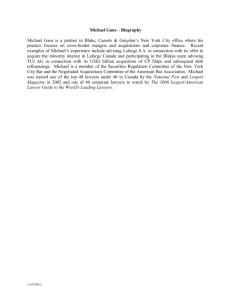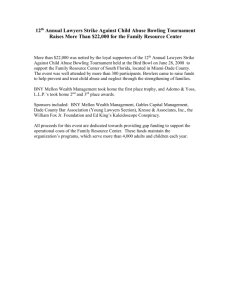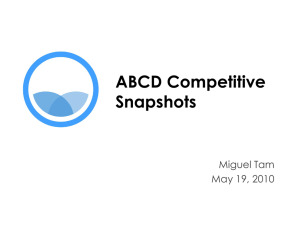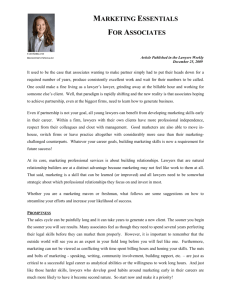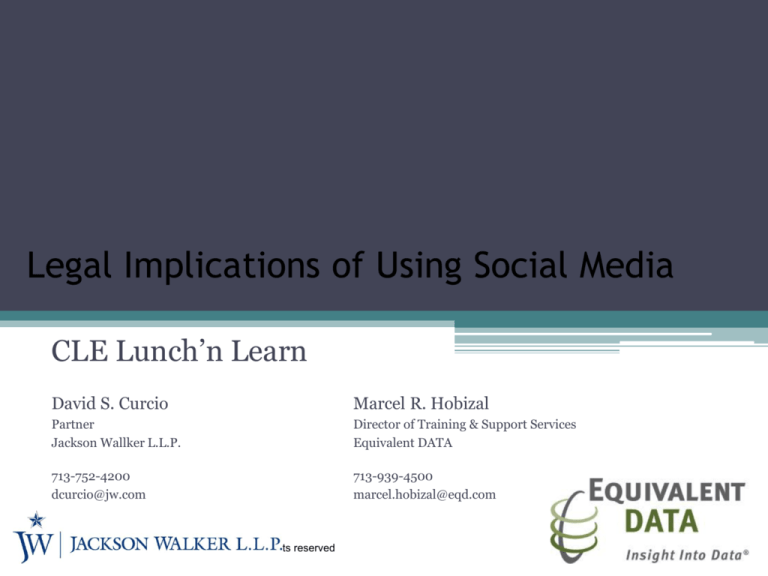
Legal Implications of Using Social Media
CLE Lunch’n Learn
David S. Curcio
Marcel R. Hobizal
Partner
Jackson Wallker L.L.P.
Director of Training & Support Services
Equivalent DATA
713-752-4200
dcurcio@jw.com
713-939-4500
marcel.hobizal@eqd.com
Copyright © 1998 - 2008 Digital Discovery Corp. All rights reserved
What is Social Media?
“Forms of electronic communication (as Web sites for
social networking and microblogging) through which
users create online communications to share
information, ideas,personal messages, and other content
(as videos)”
social media. 2011. In Merriam-Webster.com.
Retrieved October 10, 2011, from http://www.merriamwebster.com/help/citing.htm
2
The Social Media Numbers:
Linkedin = 100+ million users
44.2 million users live in the United States.
Facebook = 800+ million users
Each month, 30 billion pieces of content are generated and shared.
In May 2011, Americans spent 53.5 billion minutes on Facebook.
Twitter = 200+ million users
Each day users are sending 200 million tweets per day.
You Tube = 120+ million videos
Users upload 35 hours of video every minute.
WordPress = 384+ thousand users
In one day, 762+ thousand new posts and 803+ thousand comments.
Foursquare = 10+ million users
In 2010, 3400% growth.
3
4
Sharing Practically Everything….
People will share
practically their
entire life online,
no matter how
mundane.
5
Sharing Practically Everything….
Social Media can
provide lawyers
with a digital
treasure of
information.
6
Frequency and Type of Use
Lawyers rely on a variety of social media to connect,
collaborate and engage online as part of their professional
and personal lives.
1/3 of corporate counsel and close to ½ of private sector lawyers who
participate in social networks for professional purposes do so on a least a
daily basis.
The majority of lawyers who participate in professional online
communities report doing so once per week or more reported using
social media in litigation.
6% of lawyers participate in microblogging (Twitter, etc.) but roughly
70% of those who do, report doing so at least once per week.
1/3 of corporate counsel and close to 1/2 of private practice lawyers who
read and add comments or ratings to articles, blogs and other online
content do so on at least a daily basis.
Lawyers who use online content sharing (SlideShare, Flickr, YouTube,
etc.) do so weekly or less.
Martindale.com. (2009). Survey Reveals Growth in Online Social Networking by Lawyers Over the Past Year. Retrieved October 11, 2011, from
http://www.lexisnexis.com/community/lexishub/blogs/legaltechnologyandsocialmedia/archive/2009/09/18/survey-reveals-substantial-7
growth-in-online-social-networking-by-lawyers-over-the-past-year.aspx
Online Social Media Information
“The Internet isn’t written in pencil, Mark. It’s written in ink.”
Erica Albright (Rooney Mara) to Mark Zuckerberg (Jesse Eisenberg), “The Social Network” (2010).
What type of Social Media information is available?
Incriminating photos
Incriminating statements or wall posts.
Status updates
Mood indicators
Lists of friends
Likes and Dislikes
Blog Posts
8
Online Social Media Example
Kevin’s Family Emergency
9
Online Social Media Example
Kevin’s Family Emergency
10
Online Social Media Example
Kevin’s Family Emergency
turned out to be a
Halloween Party in
New York.
11
Online Background Information
What type of Background information is available?
Up-to-date contact information includes address history, phone
numbers, cell phone numbers, email addresses and P.O. Box.
Names and alias used, household income and companies worked.
Relatives, household members, neighbors and associates.
Marital, family status, marriage history and divorce records.
Nationwide criminal record check and sex offender check.
Bankruptcies, liens, judgments, court records: dates, parties, lawyer
names for both parties, verdicts.
Criminal and background records: police files, arrest and jail records.
Age and DOB – birth records and hospital records.
Property and real estate records.
Business ownership and professional lists.
12
Obtaining Social Media Information
How do obtain the information?
Profiles and content that can be publically viewed are fair game.
Discovery requests to the party.
A motion compelling the user to execute a consent form permitting the
discovery.
Free Tools & Solutions:
Addictomatic.com - aggregates RSS feeds and specific terms
Blogpulse.com - search for blog posts by keyword
Boardreader.com - search mulitple message boards and forums
Omgili.com - focuses on “many to many” user generated content
Tweetbeep.com - track mentions of your brand on Twitter in real time
Twitrratr.com - rates mentions of your search term (+, neutral or -)
Tweetdeck.com - aggregates Twitter search and lifestreams
Paid Tools & Solutions:
Radian6, BuzzMetrics, Visible Technologies, Techrigy SM2, Converseon,
Collective Intellect, Trackur and BrandsEye.
13
Tracking Down Anyone Online
Free Tools & Solutions:
ZabaSearch.com – find anyone’s home address(es) & phone number
Pipl.com - aggregates information about a person
Wink.com – search several social sites at once
Zoominfo.com – search for employment results
Google.com – use advanced Google techniques for better results
People.yahoo.com – Yahoo’s people finder
Peoplefinder.com
Spokeo.com – organizes vast quantities of white-pages information
411.com
Whowhere.com
Paid Tools & Solutions:
Intelius – http://www.intelius.com
PeopleFinder.com: http://www.peoplefinder.com
Acxiom – http://www.acxiom.com
Spokeo – http://www.spokeo.com
14
Social Media and Privacy
Are public postings on social media sites private?
A public posting on a public site is generally not private.
See Yourself on Addictomatic.com
Are private pages on social media site private?
With whom have you shared it?
With whom have they shared it?
Could be “reasonably calculated to lead to the discovery of admissible
evidence”
Easily authenticated.
15
Applicable Laws
ECPA: Electronic Communications Privacy Act
18 U.S.C. § 2510-2522
FSCA: Stored Communications Act
18 U.S.C. §§ 2701 to 2712
NLRA: National Labor Relations Act
29 U.S.C. § 151–169
CDA: Communications Decency Act
47 U.S.C. § 230
DMCA: Digital Millenium Copyright Act
17 U.S.C. §§ 512, 1201–1205, 1301–1332; 28 U.S.C. § 4001
Other: Similar state laws, FTC Guidelines, SEC Regulations
16
Inapplicable(?) Laws
SOPA/PIPA DOA?
• Cease and desist orders
• Notice/Counternotice
• Preventive Measures by internet providers
• IP Attache in every embassy
17
Legal Implications
Lawyers
Investigation of Witnesses
Investigation of Jurors
New/Old Causes of Action
Research tools
Judges and Jurors
Blogging and updating
Researching
Employers
Background checks
Harassment
18
Lawyer’s Personal Use of the Internet
Confidentiality and Privacy Concerns
Improper Disclosures
Revealing Client Secrets
Revealing Case Strategy
Stupid Disclosures
Angering Bosses
Angering Clients
Deceptive Conduct
Marketing
Investigating
Inadvertent Attorney-Client Relationship
19
Lawyer’s Professional Use of the Internet
Party/Witness Investigation
Are they really injured?
Are they “friends” with other parties?
Research
Use of trademarks
Free alternatives
Litigation
Libel by tweet (Publication)
Duty to tweet? (University of Virginia shooting)
Client Contact
Access to files
Shared document review
20
Judge’s Use of the Internet
Appearance of Unprofessionalism
Friending Lawyers
Fundraising
Commenting on Pending Matters
Campaigning
“Private” Postings
21
Jurors’ Use of the Internet
Sworn to secrecy, but…
Disclosure of trial testimony and deliberations
“I was only tweeting”
Relying on “Friend’s” comments
Contact with lawyers and witnesses
Friend requests
Searching for biographies
Researching issues in the case
Scientific issues
Media reports
22
Employers Use of the Internet
Advertising and marketing
Employee forums
Consumer forums
Prescreening prospective employees
Background check
Facebook check
Monitoring current employees
Blogs, posts and tweets
Liability for monitored comments
Liability for privacy violations
23
Delta Uniform + Inappropriate Poses
= Fired!
24
Conclusion
Use tools to find social media evidence but remember to
know where the lines are drawn on ethics and
discoverability.
Treat all your posts as public and permanent.
Know your employer’s policies and restrictions.
Keep informed on latest laws and proposed laws.
25



